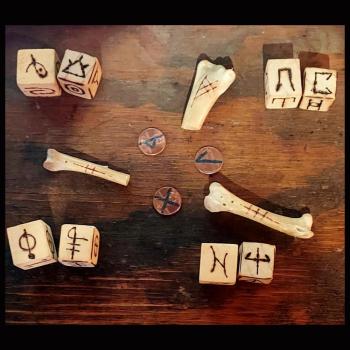With the internal mind focused on heaven and the external mind focused on this world, it's easy to see how the two can be in conflict. This is the cause of our temptations; they represent our struggle to make our external mind submit to our higher levels. Our natural mind is the only part of us that can be out of heaven's order, cause trouble, and be perverted. It often is—we all know that from experience! It is our natural mind that exercises free will, and it is there that we choose either to obey the Lord or disobey. When our external mind is aligned with our internal mind, it is because we have chosen self-compelled obedience.
Our natural or external mind, then, is the source of all our problems, individually and collectively. In order for us to progress spiritually and move toward heaven, our natural mind needs to be reformed and regenerated—to be reborn. This, says Swedenborg, is what is meant by John 3:3: "Most assuredly,
I say to you, unless one is born again, he cannot see the kingdom of God."
In order for this to happen, our internal mind must take possession of and transform our external mind. But how is this done? How, in other words, can we let heaven's influence flow into us?
A short answer would be: We have to shun our evils because they are sins against the Lord and not for any lesser or worldly reason, such as self-aggrandizement or social status.
A more comprehensive answer is that while we are born with a natural mind, it is only the beginning. We can develop our understanding by means of what we learn from the world around us. We could go on learning and learning and learning for the rest of our life; we could gain two or three university degrees; we could even acquire an impressive understanding of the Bible, the Word of God. But we would still remain natural in quality unless we began to live according to that understanding.
The more we live according to the Word, the more we are motivated by real goodness. Our actions begin to become spiritual in quality, because the spiritual level of our internal mind is opened. If this happens, our natural mind will be opened at the top, so that what exists at the spiritual level of the mind (charity or love toward the neighbor) could flow down into our conscious mind and move us in our everyday lives.
However, above the spiritual level of our mind is the celestial level. If we were to go on living a life of charity for the rest of our lives, we would indeed become heavenly, but we would never rise above that middle spiritual level. To go beyond that, we need to come into celestial love—loving the Lord (or rather, having his love come into us). We accomplish that by obeying the Lord's commandments for his sake rather than any selfish thought of promoting ourselves. In that way, love and concern for the Lord flow down into our natural mind, making it celestial or spiritual in quality (see Divine Love and Wisdom §237).
Because we have free will, we can also choose to keep our natural mind closed at the top, so that none of these higher loves can flow in. That happens to the extent that we do not live according to what the Word of God teaches us to believe and do. In that case, we would remain the same forever, even in the spiritual world, and never be able to experience heaven's love.
In summary, regeneration or rebirth consists in allowing the higher levels of our mind to act upon our natural level, transforming it and making it spiritual or celestial in quality. (There is a fuller explanation of regeneration in chapter 2.) However, these levels do not simply merge one into the other; they remain distinctly separate, which is the idea behind the concept of "discrete degrees" discussed above. These levels also remain distinct from the brain and the body where it lives.
The Body
The body is not the person. The mind is the person. By and large, the world around us is profoundly ignorant of that fact. What is the usual reply when you ask people, "How are you today?" You are often treated to a recital of their aches and pains or their current disease. That is perfectly understandable, because people do tend to think of the body as the person. Shape and appearance are often among what first come to mind when a person is named. That is especially the case with little children. They experience what is probably their first great shock when they realize that a beautiful-looking person does not necessarily have a character to match. Young people also, when they are searching for their future married partner, tend to think that physical appearance is the most valuable attribute. Subconsciously, they are equating the body with the person. But doctrine, experience, and common sense unite to tell us that this is not necessarily so. We all know on reflection that we are to judge people by the quality of their minds.
Swedenborg writes that the doctrine of resurrection of the physical body following the Last Judgment was actually the result of confusing the body with the person. In truth, he tells us, human beings are resurrected in the spirit—in the world of spirits, which, as discussed in the previous chapter, is where we awaken after our physical bodies cease to function. Only the Lord was resurrected in his physical body.




